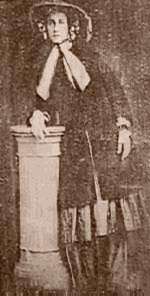Readings:
This commemoration is a 2018 addition to A Great Cloud of Witnesses
Return to Lectionary Home Page
Webmaster: Charles Wohlers
Last updated: 3 November 2018
AMELIA JENKS BLOOMER
SOCIAL REFORMER, 30 DEC 1894
 Amelia
Jenks was born in New York in 1818, reared as a Presbyterian, and as a
young woman became an activist for the anti-slavery, anti-alcohol, and
women's votes movements. One of her concerns has made her name a part
of the language. In her day, women's fashions encouraged tightly laced
waists, involving severe health problems. (The fashions were denounced
in 1728 by William Law--see 9 April.) The
fashion also called for skirts trailing the ground, an arrangement that
made it difficult to keep the skirts reasonably clean, especially since
the streets were full of horses. Mrs. Bloomer designed a women's costume
featuring what are known as Turkish pants, or harem pants (remember the
television show I Dream of Jeannie), loose baggy trousers gathered
into tight bands at the ankles and waist. Over these she wore a mid-calf-length
skirt. It seems a thoroughly modest garb, but it excited indignation and
ridicule. (At least well into the 1940's, women's underpants, and women's
baggy outer pants worn for athletics, were known as "bloomers.")
Amelia
Jenks was born in New York in 1818, reared as a Presbyterian, and as a
young woman became an activist for the anti-slavery, anti-alcohol, and
women's votes movements. One of her concerns has made her name a part
of the language. In her day, women's fashions encouraged tightly laced
waists, involving severe health problems. (The fashions were denounced
in 1728 by William Law--see 9 April.) The
fashion also called for skirts trailing the ground, an arrangement that
made it difficult to keep the skirts reasonably clean, especially since
the streets were full of horses. Mrs. Bloomer designed a women's costume
featuring what are known as Turkish pants, or harem pants (remember the
television show I Dream of Jeannie), loose baggy trousers gathered
into tight bands at the ankles and waist. Over these she wore a mid-calf-length
skirt. It seems a thoroughly modest garb, but it excited indignation and
ridicule. (At least well into the 1940's, women's underpants, and women's
baggy outer pants worn for athletics, were known as "bloomers.")
Mrs. Bloomer and her husband eventually settled in
Council Bluffs, Iowa, where she worked to promote churches, schools,
libraries, and progressive and reform movements. On one occasion
she said:
"The same Power that brought the slave out of bondage
will, in His own good time and way, bring about the emancipation of women,
and make her the equal in power and dominion that she was in the
beginning."
by James Kiefer